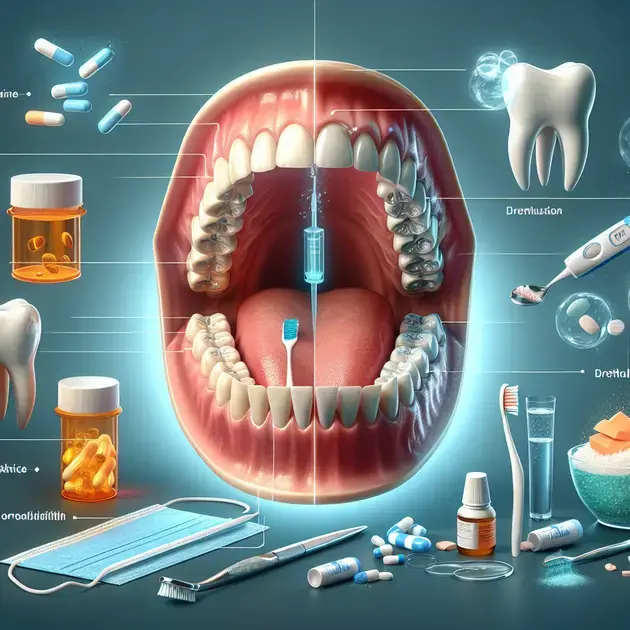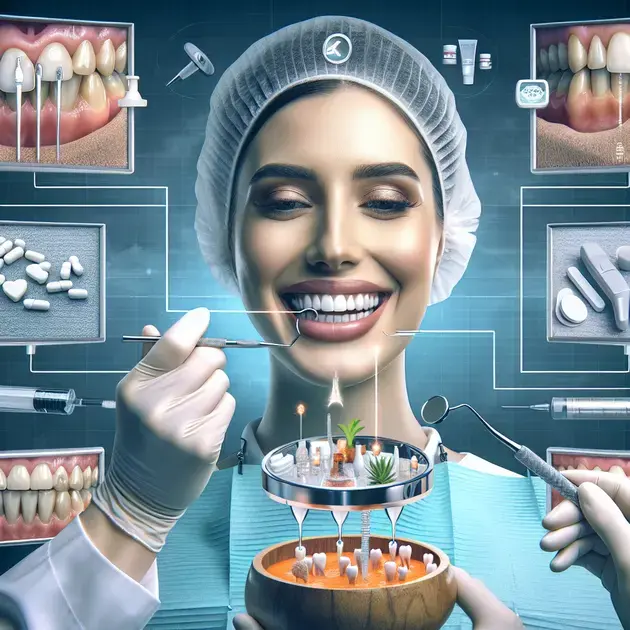Periodontitis is a serious gum infection that damages the soft tissue and destroys the bone that supports your teeth. Fortunately, with the right medication, this condition can be effectively managed and treated. In this comprehensive guide, we will explore the various effective medications available for periodontitis, providing you with valuable information to improve your oral health.
Recent studies have shown that a combination of antibiotics and deep cleaning procedures, such as scaling and root planing, can significantly reduce inflammation and prevent further progression of periodontitis. By following a tailored medication regimen prescribed by your dentist or periodontist, you can effectively combat the disease and restore the health of your gums and teeth.

**Effective Treatment Options for Periodontitis**
1. Professional Dental Cleaning
One effective treatment option for periodontitis is getting regular professional dental cleanings. Dentists recommend having a professional cleaning every six months to remove plaque and tartar buildup. This can help prevent gum disease from progressing and worsening.
How to access this treatment:
You can schedule a professional dental cleaning with your local dentist or dental hygienist. Most dental practices have online booking systems, or you can call their office directly to make an appointment.
2. Scaling and Root Planing
Another treatment option for periodontitis is scaling and root planing, also known as deep cleaning. This procedure involves removing plaque and tartar from below the gumline to help eliminate bacteria and prevent further infection.
How to access this treatment:
To undergo scaling and root planing, you will need to schedule an appointment with a periodontist, a dental specialist who focuses on gum disease treatment. You can find a periodontist through the American Academy of Periodontology website or by asking for a referral from your regular dentist.
Understanding the Importance of Medication
1. Antibiotics
Medication plays a crucial role in managing periodontitis, especially in cases where the infection is severe. Antibiotics may be prescribed to help fight off bacteria and reduce inflammation in the gums.
How to access this treatment:
To obtain antibiotics for periodontitis, you will need a prescription from your dentist or periodontist. Make an appointment for an evaluation, and if antibiotics are deemed necessary, they will provide you with the appropriate medication.
Key Steps to Managing Periodontitis
1. Daily Oral Hygiene Routine
One of the key steps in managing periodontitis is maintaining a consistent daily oral hygiene routine. This includes brushing your teeth twice a day, flossing regularly, and using an antiseptic mouthwash to help reduce bacteria in the mouth.
How to incorporate this into your routine:
You can track your daily oral hygiene activities using apps like “Brush DJ” or “MyDentist.” These apps provide reminders and tips for maintaining good oral health habits.

Understanding the Importance of Medication
Medication plays a crucial role in the treatment and management of various health conditions, including periodontitis. When it comes to periodontal disease, the right medications can help control inflammation, prevent infection, and promote healing. Understanding the importance of medication in periodontitis treatment is essential for achieving optimal oral health.
One key aspect of medication in periodontal care is its ability to target the underlying causes of the disease. Antibiotics, for example, can help eliminate harmful bacteria that contribute to gum disease, allowing the gums to heal and preventing further progression of the condition. Other medications, such as antimicrobial mouth rinses, can also play a vital role in reducing bacteria in the mouth and controlling inflammation.
Moreover, medication can help manage the symptoms of periodontitis, such as pain and swelling. By reducing these symptoms, medications can improve the patient’s quality of life and make it easier to undergo necessary dental procedures to treat gum disease effectively. Compliance with medication regimens is crucial to ensuring the desired outcomes in periodontal treatment.
It is essential for patients to communicate openly with their dental healthcare providers about the medications they are taking, including any over-the-counter drugs or supplements. This information helps ensure that the prescribed medications do not interact with other substances and that they are safe and effective for the individual’s unique health profile. Understanding the importance of medication and following the treatment plan as prescribed can significantly impact the success of periodontitis management.
Key Steps to Managing Periodontitis
Managing periodontitis involves a comprehensive approach that combines professional dental care with effective home oral hygiene practices. The following key steps are essential in the successful management of periodontal disease:
1. Professional Dental Cleanings:
Scheduling regular dental cleanings with a dental hygienist is vital for removing plaque and tartar buildup from the teeth and gums. These deep cleanings help prevent the progression of gum disease and maintain oral health.
2. Proper Brushing and Flossing Techniques:
Effective oral hygiene at home is critical for managing periodontitis. Brushing teeth twice a day with a fluoride toothpaste and flossing daily help remove bacteria and plaque, reducing the risk of gum disease progression.
3. Use of Antimicrobial Mouth Rinses:
In some cases, dentists may recommend the use of antimicrobial mouth rinses to reduce bacteria in the mouth and control inflammation. Incorporating these rinses into the daily oral hygiene routine can help manage periodontitis effectively.
4. Healthy Lifestyle Habits:
Adopting a healthy lifestyle, including a balanced diet and avoiding tobacco use, can contribute to better overall oral health. Eating a nutritious diet rich in fruits, vegetables, and lean proteins supports gum health and healing.
5. Regular Dental Check-ups:
Regular dental visits allow dentists to monitor the progression of periodontitis, provide timely interventions, and adjust treatment plans as needed. Early detection and intervention play a crucial role in managing gum disease successfully.
Tips for Choosing the Right Treatment
When it comes to selecting the most suitable treatment for periodontitis, several factors should be considered to ensure optimal outcomes. The following tips can help individuals choose the right treatment for managing gum disease:
1. Consultation with a Periodontal Specialist:
Seeking evaluation and treatment from a periodontal specialist can provide expert insights into the specific nature of the gum disease and personalized treatment recommendations. Periodontists specialize in the diagnosis and treatment of periodontitis.
2. Consideration of Treatment Options:
Discuss various treatment options with the dental healthcare provider, considering factors such as the severity of the disease, cost, and potential side effects. Understanding the available treatments helps individuals make informed decisions about their oral health care.
3. Individualized Treatment Plans:
Opt for a treatment plan that is tailored to individual needs and addresses the underlying causes of periodontitis. Personalized care can lead to better outcomes and improved long-term oral health.
4. Monitoring and Follow-up Care:
Regular monitoring and follow-up appointments with the dental care team are essential for tracking the progress of treatment and making adjustments as needed. Consistent follow-up care enhances the effectiveness of periodontal treatment.
5. Emphasis on Preventive Measures:
Incorporate preventive measures into the treatment plan to maintain gum health and prevent future recurrence of periodontitis. Good oral hygiene practices, along with lifestyle modifications, play a key role in sustaining the results of treatment.
Conclusion
Understanding the importance of medication in treating periodontitis is crucial for achieving optimal oral health. Medications play a key role in targeting the underlying causes of gum disease, such as harmful bacteria, inflammation, and infection. By managing symptoms like pain and swelling, medications not only improve the patient’s quality of life but also facilitate effective dental procedures for treating periodontitis.
Effective management of periodontitis involves a comprehensive approach that combines professional dental care with proper home oral hygiene practices. From regular dental cleanings to adopting healthy lifestyle habits and incorporating antimicrobial mouth rinses, these key steps are essential for maintaining gum health and preventing the progression of gum disease.
When choosing the right treatment for periodontitis, individuals should consider consulting with a periodontal specialist, discussing treatment options with their dental healthcare provider, and opting for personalized treatment plans tailored to their specific needs. Monitoring progress, regular follow-up care, and emphasizing preventive measures are vital aspects that contribute to successful management of gum disease and long-term oral health.



